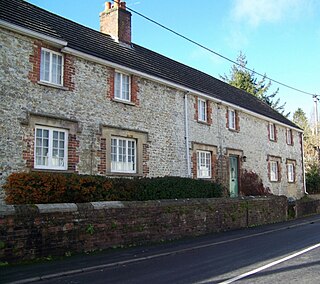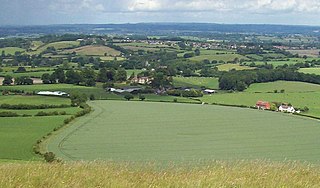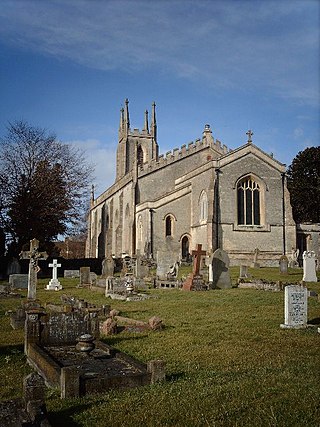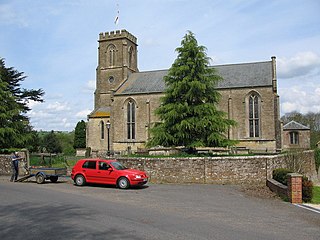
Warminster is a historic market town and civil parish in south-west Wiltshire, England, on the western edge of Salisbury Plain. The parish had a population of 18,173 in 2021.

West Wiltshire was a local government district in Wiltshire, England, between 1974 and 2009, when it was superseded by Wiltshire Council.

Bishops Cannings is a village and civil parish in the Vale of Pewsey in Wiltshire, England, 3 miles (5 km) north-east of Devizes. The parish includes the village of Coate and the hamlets of Bourton, Horton and Little Horton.

Dilton Marsh is a village and civil parish in the far west of the county of Wiltshire, in the southwest of England. The village is about 1.5 miles (2.4 km) southwest of the centre of the town of Westbury; Dilton Marsh remains a distinct settlement with its own character and community, bounded and separated from Westbury Leigh by the Biss Brook.

Reading Minster, or the Minster Church of St Mary the Virgin, is the oldest ecclesiastical foundation in the town of Reading, Berkshire, England. Although eclipsed in importance by the later Reading Abbey, Reading Minster regained its status after the destruction of the Abbey and is now an Anglican parish church.

Sir Arthur William Blomfield was an English architect. He became president of the Architectural Association in 1861; a Fellow of the Royal Institute of British Architects in 1867 and vice-president of the RIBA in 1886. He was educated at Trinity College, Cambridge, where he studied Architecture.

Bishopstrow is a small village and civil parish in Wiltshire, England, on the southeastern edge of the town of Warminster. The village is about 1.5 miles (2.4 km) from the town centre, south of the old Warminster to Salisbury road, formerly the A36, now the B3414.

Boyton is a village and civil parish in Wiltshire, England. It lies in the Wylye Valley within Salisbury Plain, about 6 miles (10 km) south-east of Warminster and 13 miles (21 km) north-west of Salisbury. The parish includes the village of Corton.

Upton Scudamore is a village and civil parish in Wiltshire, England. The village lies about 1.8 miles (3 km) north of the town of Warminster and about the same distance south of Westbury. The parish includes the hamlet of Halfway.

Chapmanslade is a village and civil parish in the county of Wiltshire, in the southwest of England. The parish is on the county border with Somerset and includes the hamlets of Huntenhull Green, Short Street and Thoulstone. The village lies about 3.5 miles (6 km) from each of three towns: southwest of Westbury, northwest of Warminster, and east of Frome.

Corsley is a hamlet and civil parish 3 miles (5 km) west of Warminster in Wiltshire, England. The parish is on the county border with Somerset; the Somerset town of Frome is about 3 miles (5 km) to the northwest. The largest settlement in the parish is Corsley Heath, which is on the A362 Warminster-Frome road.

Stockton is a small village and civil parish in the Wylye Valley in Wiltshire, England, about 8 miles (13 km) southeast of Warminster. The parish includes the hamlet of Bapton.

Christ Church is an Anglican church building serving a parish on the southern side of Warminster, Wiltshire, England.

St Margaret's, Corsley, is the Church of England parish church of Corsley in Wiltshire, England. In 1968 the church was designated as Grade II listed.

Sutton Veny is a village and civil parish in the Wylye valley, to the southeast of the town of Warminster in Wiltshire, England; the village is about 3 miles (5 km) from Warminster town centre. 'Sutton' means 'south farmstead' in relation to Norton Bavant, one mile (1.6 km) to the north. 'Veny' may be a French family name or may describe the village's fenny situation.

East Knoyle is a village and civil parish in Wiltshire, in the south-west of England, just west of the A350 and about 9 miles (14 km) south of Warminster and 5 miles (8 km) north of Shaftesbury, Dorset. It was the birthplace of the architect Sir Christopher Wren. The parish includes the hamlets of Holloway, Milton, The Green, Underhill and Upton.

The Church of St Peter and St Paul is in the market town of Ormskirk, Lancashire, England. Dating from no later than the 12th century, it is one of only three churches in England to have both a tower and spire, and the only one to have them both at the same end of the church. It is an active Anglican parish church in the Diocese of Liverpool. The church is recorded in the National Heritage List for England as a designated Grade II* listed building.

Teffont Magna, sometimes called Upper Teffont, is a small village and former civil parish in the Nadder valley in the south of the county of Wiltshire, England. For most of its history, Teffont Magna was a chapelry of neighbouring Dinton. In 1934 it was combined with the parish of Teffont Evias, just to the south, to form a united Teffont parish.

Poulshot is a village and civil parish in Wiltshire, England. Its nearest town is Devizes, about 2.5 miles (4 km) to the northeast. The parish includes the hamlet of Townsend.

St John's Church, in full the Church of St John the Evangelist, is a Church of England church in the Boreham area in the south-east of the town of Warminster, Wiltshire, England. It was built in 1865 and is a Grade II* listed building.





















